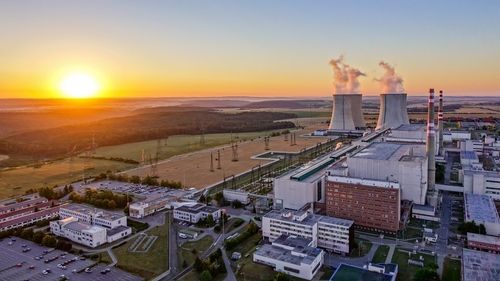Billionaires Bill Gates, Jeff Bezos, and Sam Altman Are Investing in Nuclear Energy Hand Over Fist. Should You?

What do Jeff Bezos, Bill Gates, and Sam Altman have in common?
The easy answer is that they've all led technologically innovative companies. Bezos, of course, founded Amazon. Gates co-founded Microsoft. Altman is CEO and co-founder of OpenAI.
All three men are also billionaires. Bezos is the wealthiest of the group with a net worth of around $226 billion. Gates has given away much of his fortune but is still worth over $105 billion. Altman is barely in the club with a net worth of $1 billion.
But there's another common denominator between Bezos, Gates, and Altman that many people might not know about. All three billionaires are investing in nuclear energy hand over fist.
Billionaires going nuclear
Although Bezos passed the baton as Amazon's CEO to Andy Jassy, he remains the executive chair of the company's board of directors and one of its largest shareholders. Amazon inked deals earlier this year to develop a new kind of nuclear reactor called small modular reactors.
That's not Bezos' only connection with the nuclear energy industry, though. He's also backing General Fusion, a Canadian company working to develop nuclear fusion technology.
Like Bezos, Gates no longer runs the company he helped found but is still Microsoft's chairman of the board. Microsoft is investing in nuclear energy through a deal with Constellation Energy (NASDAQ: CEG) to reboot the Three Mile Island nuclear plant. The tech giant wants more electricity to power its data centers.
Gates helped found TerraPower, a company focused on developing advanced nuclear energy technology. He serves as TerraPower's chairman of the board and invested $1 billion in a new nuclear power plant that was designed by the company.
While Altman maintains his day job running OpenAI, he has also invested in nuclear energy start-up Oklo (NYSE: OKLO). Altman is Oklo's chairman. Oklo is designing advanced nuclear fission power plants that can use nuclear waste as fuel.
Back in style
Nuclear energy is back in style for a simple reason: The demand for electricity is growing rapidly. The boom in data centers, which are energy hogs, fueled by artificial intelligence (AI) is one key driver behind this surging demand.
Tesla CEO Elon Musk believes that there will be a supply shortage of electricity as soon as next year because of AI and electric vehicles. Even if he's wrong on the timing, more supply is needed to keep up with the energy demand.
Building new power-generating plants that use fossil fuels isn't ideal due to climate change concerns. Renewable energy alternatives such as wind and solar can help address the challenge.
But nuclear energy addresses some of the limitations of wind and solar. In particular, it's always available and is more scalable.
Should you invest in nuclear energy, too?
I've always maintained that investors shouldn't blindly follow in the footsteps of billionaires. Bezos, Gates, and Altman have much more money they can afford to lose than most of us. However, I think they're onto something big with their investments in nuclear energy.
Should you invest in nuclear energy, too? It's definitely worth considering, in my view.
The good news is that there are nuclear energy stocks for nearly any investment style. Aggressive growth investors could jump on the Oklo bandwagon with Altman. It's a risky stock to buy but could pay off handsomely over time.
If you like growth without as much risk, Constellation Energy could be a good pick. I wouldn't bank on the stock delivering the kind of gains in the future as it has this year, though.
Income investors might especially like Emerson Electric (NYSE: EMR). The company is a Dividend King with 67 consecutive years of dividend increases. Emerson is a "picks-and-shovels" play with nuclear energy. Its automation and valve technology are used by nuclear power plants.







